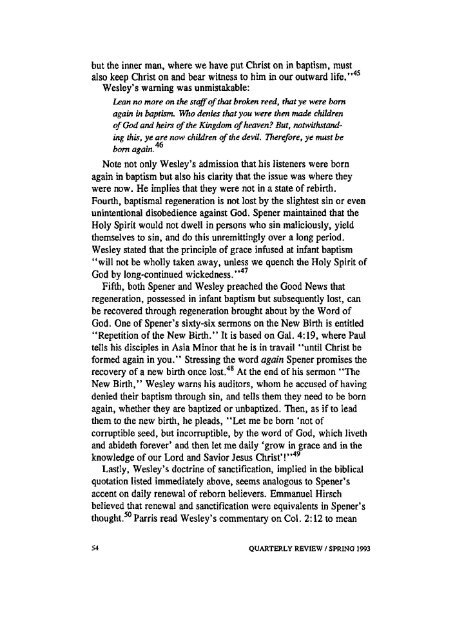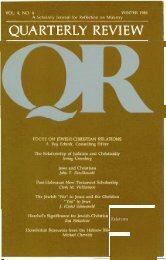TJieodore W. Jennings, Jr. The Meaning of ... - Quarterly Review
TJieodore W. Jennings, Jr. The Meaning of ... - Quarterly Review
TJieodore W. Jennings, Jr. The Meaning of ... - Quarterly Review
You also want an ePaper? Increase the reach of your titles
YUMPU automatically turns print PDFs into web optimized ePapers that Google loves.
ut the inner man, where we have put Christ on in baptism, must<br />
also keep Christ on and bear witness to him in our outward life." 45<br />
Wesley's warning was unmistakable:<br />
Lean no more on the staff <strong>of</strong> that broken reed, that ye were born<br />
again in baptism. Who denies that you were then made children<br />
<strong>of</strong> God and heirs <strong>of</strong>the Kingdom <strong>of</strong> heaven? But, notwithstanding<br />
this, ye are now children <strong>of</strong>the devil. <strong>The</strong>refore, ye must be<br />
born again.***<br />
Note not only Wesley's admission that his listeners were born<br />
again in baptism but also his clarity that the issue was where they<br />
were now. He implies that they were not in a state <strong>of</strong> rebirth.<br />
Fourth, baptismal regeneration is not lost by the slightest sin or even<br />
unintentional disobedience against God. Spener maintained that the<br />
Holy Spirit would not dwell in persons who sin maliciously, yield<br />
themselves to sin, and do this unremittingly over a long period.<br />
Wesley stated that the principle <strong>of</strong> grace infused at infant baptism<br />
"will not be wholly taken away, unless we quench the Holy Spirit <strong>of</strong><br />
God by long-continued wickedness." 47<br />
Fifth, both Spener and Wesley preached the Good News that<br />
regeneration, possessed in infant baptism but subsequently lost, can<br />
be recovered through regeneration brought about by the Word <strong>of</strong><br />
God. One <strong>of</strong> Spener's sixty-six sermons on the New Birth is entitled<br />
"Repetition <strong>of</strong> the New Birth." It is based on Gal. 4:19, where Paul<br />
tells his disciples in Asia Minor that he is in travail "until Christ be<br />
formed again in you." Stressing the word again Spener promises the<br />
recovery <strong>of</strong> a new birth once lost. 48<br />
At the end <strong>of</strong> his sermon "<strong>The</strong><br />
New Birth," Wesley warns his auditors, whom he accused <strong>of</strong> having<br />
denied their baptism through sin, and tells them they need to be born<br />
again, whether they are baptized or unbaptized. <strong>The</strong>n, as if to lead<br />
them to the new birth, he pleads, "Let me be born 'not <strong>of</strong><br />
corruptible seed, but incorruptible, by the word <strong>of</strong> God, which liveth<br />
and abideth forever' and then let me daily 'grow in grace and in the<br />
knowledge <strong>of</strong> our Lord and Savior Jesus Christ'!" 49<br />
Lastly, Wesley's doctrine <strong>of</strong> sanctification, implied in the biblical<br />
quotation listed immediately above, seems analogous to Spener's<br />
accent on daily renewal <strong>of</strong> reborn believers. Emmanuel Hirsch<br />
believed that renewal and sanctification were equivalents in Spener's<br />
thought. 50<br />
Parris read Wesley's commentary on Col. 2:12 to mean<br />
54 QUARTERLY REVIEW / SPRING 1993












